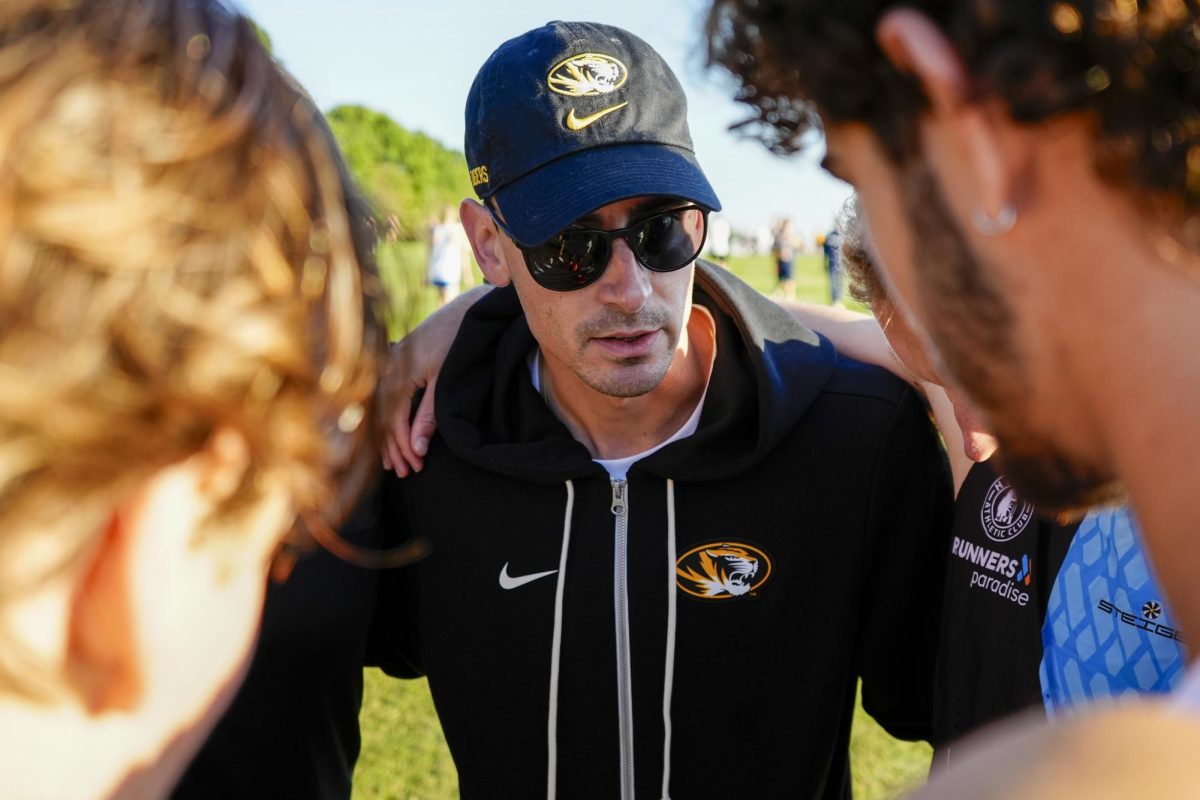Missouri’s inaugural Southeastern Conference campaign was characterized by a bevy of lowlights.
Surrendering 24 consecutive points in a nightmarish second half against Georgia, the comedy of errors that was the Vanderbilt game, quarterback James Franklin’s atrocious four-interception performance against Florida and a humiliating loss at home to a 7-5 Syracuse team are all viable candidates for Missouri’s nadir.
But last Saturday’s 59-29 lambasting at the hands of Texas A&M was the lowest of lows for the 2012 Tigers.
With bowl eligibility on the line, Missouri was annihilated to the tune of a 42-0 deficit to the Aggies after six A&M possessions. In what was one final chance for Tiger seniors to extend their football playing careers by a game — an opportunity they squandered the week before — coach Gary Pinkel’s bunch was perplexingly listless in front of a national television audience.
The 30-point drubbing served as the end game of the program’s streak of seven consecutive bowl appearances and signaled the culmination of Tiger football’s disenchanting first year of marriage with the SEC.
Remember when a sea of gold-clad fans rushed Faurot Field after then-undefeated Missouri prevailed against then-No. 1 Oklahoma, triggering Bowl Championship Series dreams across the Show-Me State? That fateful night 25 months ago seems more like 25 years ago.
Where to from here is the inescapable question facing a program that’s gone just 16-15 and 4-9 on the road in the 31 games since Pinkel exorcised his Oklahoma demons.
The arrow would seemingly point toward change for a team whose lone conference victories came against opponents that were a combined 1-15 in SEC play and whose head coaches were subsequently fired in the weeks following their defeats to MU.
Pinkel, however, has been adamant in his refusal to alter the program’s underpinning throughout the season.
“If we coach better and if we play better, then we’ll win more, and that’s just the way it is,” Pinkel said prior to the Kentucky game. “The system doesn’t change. We just have to coach our players to do a better job, and then we’ll win more. That’s what we’ve done since I got here, and that will never change.”
Pinkel doesn’t want to change. That needs to change.
“What we do works,” Pinkel said.
In the offense-first, defense-maybe-later, non-scoreboard operator friendly Big 12 Conference, sure. Missouri’s four- or five-wide offensive sets flourished in the Big 12, where such schemes were commonplace.
But those days are gone.
During the eight-month honeymoon that preceded the SEC-opening loss to Georgia, the question was who would face the steeper learning curve: Missouri’s offense adjusting to the SEC’s rugged, smash-mouth defenses, or those bone-rattling defenses to the Tigers’ finesse offense.
The answer, emphatically, was the former.
Missouri’s offense’s was ravaged by a slew of injuries to Franklin and the linemen blocking for him and redshirt freshman Corbin Berkstresser, and the result wasn’t pretty. The Tigers finished the season 81st nationally in passing, 91st in rushing and 82nd in scoring offense with a 33 percent conversion rate on third down. As for the 2011 Tigers? Sixty-fourth in passing, ninth in rushing and 30th in scoring while converting on third down at a 40 percent clip.
“I believe in the philosophy of what we do since the day I got here,” Pinkel told reporters following Saturday night’s debacle in College Station. “I have never changed anything in terms of the foundation of who we are and what we are and how we build our program. And because we’re not going to a bowl this year after all those injuries, I’m not going to do it. … I believe in what I’m doing.”
Following Missouri’s 19-15 loss to Vanderbilt, senior corner Kip Edwards voiced his displeasure with the practice aspect of that philosophy.
“Games are won in practice — they’re not won on Saturday,” Edwards said. “Really, they’re won Tuesday, Wednesday and Thursday in practice. We need to practice better. … It (the focus) is not where it needs to be for us to be winners in the SEC.”
At that Monday’s press conference, Pinkel said he thought the team practiced “pretty good” that week and once again reiterated his familiar rhetoric that his staff is very consistent in how it does things — something that won’t be changed.
One program that has recently made changes?
Look no further than at who was doing the shellacking Saturday night: fellow SEC-newcomer Texas A&M.
The Aggies, who struggled to a 7-6 record in their final Big 12 season, ventured into new territory with more doubts than the Tigers. Coach Kevin Sumlin was in his first year on the job, last year’s leading rusher was gone, no proven quarterbacks were on the roster and a 70th-ranked scoring defense needed shoring up.
Ten wins later — including one in Tuscaloosa against then-No. 1 Alabama — the Aggies are in the top 10 nationally, have a freshman quarterback as the Heisman front-runner, have a defense ranked 30th in scoring defense and appear to be a legitimate SEC contender for years to come.
How’d they do it?
Sumlin and offensive coordinator Kliff Kingsbury tailored an offensive attack to best utilize the team’s skill set, and Sumlin brought in Mark Snyder, a national championship-winning defensive coordinator with Ohio State, who revitalized A&M’s defense.
Texas A&M has become that football-crazed state’s premier collegiate program. The Aggies’ success is proof once-successful Big 12 programs can contend in the nation’s premier football destination with the right approach.
Texas A&M quietly went about its entrance to the SEC, and few teams made more noise on the field than the Aggies. Missouri barked a lot before the season and made barely more than a whimper on the field during it.
Without making noteworthy changes — whether they be in the form of a staff shakeup, schematic adjustments or weightlifting regiments — it’s hard to envision the Tigers becoming relevant in the SEC in the near future.
Maybe Pinkel’s right. Maybe this year’s Tigers would have notched a top 25 victory or two if healthy. Time will tell.
In his 12 seasons in Columbia, Pinkel has taken a previously destitute program to new heights, including a school-record seven consecutive bowl appearances. Missing bowl eligibility by one game for the first time since 2004 shouldn’t be enough to overshadow his substantial success at Missouri.
But, if Pinkel stays the course and the results don’t change in the next season or two, Athletic Director Mike Alden might be the one with the change to make.







